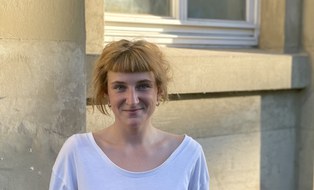Studienberatung
Die Technische Universität Dresden ist Trägerin des Zertifikats audit familiengerechte Hochschule und bietet verschiedene Services und Beratungen diesbezüglich an.
Die häufigsten an uns herangetragenen Fragen haben wir Ihnen im Folgenden zusammengestellt und beantwortet. Prüfen Sie, ob Ihr Anliegen damit erledigt werden kann:
Eine Nachmeldung zur Prüfung ist nicht über das Sekretariat oder die Lehrpersonen möglich.
Bitte wenden Sie sich ausschließlich an das zuständige Prüfungsamt, da nur dort entschieden werden kann, ob eine nachträgliche Anmeldung im Einzelfall zulässig ist. Nutzen Sie hierfür bitte die offiziellen Kontaktmöglichkeiten:
- Für Lehramtsstudiengänge: Prüfungsamt ZLSB
- Für BA-/MA-Studiengänge der Fakultät GSW: Prüfungsamt GSW
Studierende des Lehramts Oberschule benötigen für das Fach Evangelische Theologie Grundkompetenzen im Altgriechischen – und zwar nicht als formale Zulassungsvoraussetzung, sondern als tatsächliche fachliche Notwendigkeit.
Warum ist Altgriechisch wichtig?
- Der Gegenstand der wissenschaftlichen Exegese, wie sie laut LAPO I (§ 62) gefordert wird, sind die Originaltexte der Bibel, insbesondere des Neuen Testaments in altgriechischer Sprache.
- Ohne rezeptive Sprachkompetenz im Altgriechischen können zentrale theologische Begriffe, Kommentare und Forschungsliteratur nicht sinnvoll verstanden oder verwendet werden.
- Die exegetischen Methoden, die in Dresden am Institut exemplarisch gelehrt werden, setzen den altgriechischen Text voraus, nicht eine Übersetzung.
Unterschied zum Grundschullehramt
- In der LAPO I wird für das Lehramt an Oberschulen explizit von Kenntnis der Exegese und der Anwendung hermeneutischer Methoden gesprochen.
- Für das Lehramt an Grundschulen (§ 37) werden Grundkenntnisse in der biblischen Literatur, den exegetischen Methoden und der Bibelkunde erwartet.
Muss ich das Graecum nachholen?
Nein – es geht nicht um das Graecum, sondern um Grundkenntnisse im Umgang mit altgriechischen Texten. Diese sind erforderlich, um die Module erfolgreich absolvieren zu können.
Daher bietet das Institut vorbereitende Sprachkurse an (vergleichbar mit Brückenkursen in der Mathematik). Eine Prüfung im Altgriechischen ist nicht verpflichtend, aber empfehlenswert – z. B. um Ihren Lernfortschritt zu überprüfen oder sich den Kurs als Wahlmodul anrechnen zu lassen.
Wenn eine Prüfungsleistung im Prüfungsangebot bei SELMA oder HISQIS nicht erscheint, wurde sie vom Prüfungsamt nicht freigeschaltet.
So gehen Sie vor:
- Fragen Sie die Lehrperson, ob die Prüfung im Semester angeboten wird.
- Falls ja, wenden Sie sich an das Sekretariat, damit die Leistung zur Freischaltung nachgemeldet wird.
- Wenn das Modul außerhalb des Studienplans liegt, ist ggf. trotzdem eine Anmeldung über das Prüfungsamt möglich – mit diesem Formular:
Der Studienablaufplan gibt eine sinnvolle Orientierung zur zeitlichen Planung Ihres Studiums. Beachten Sie, dass einige Veranstaltungen nur jährlich angeboten werden.
Selbstrecherche ist essenziell:
- Welche Veranstaltung zu welchem Modul gehört, sehen Sie im Kommentierten Vorlesungsverzeichnis (KVV).
- Inhalte, Prüfungsanforderungen und Workload finden Sie in der Studienordnung Ihres Studienganges.
Hinweis zur Selbstrecherche: Die Studienordnung gibt auch Auskunft über den vorgesehenen Arbeitsaufwand (ECTS) – bitte machen Sie sich damit vertraut, bevor Sie den Aufwand einzelner Veranstaltungen beurteilen.
Die SPS sind verpflichtender Teil des Lehramtsstudiums. Hier einige wichtige Hinweise:
- Eine Unterrichtsstunde im Block B entspricht 45 Minuten.
- Sollten Sie die Stundenvorgaben nicht erfüllen können, wird dies individuell in der Einführungsveranstaltung geklärt.
- Der Arbeitsaufwand der SPS ist, wie bei anderen Veranstaltungen auch, in der Studienordnung geregelt.
- SPÜ-Platzreservierungen sind nur in Ausnahmefällen nachträglich möglich (z. B. bei Krankheit, familiäre Härtefälle) – bei Versäumnis der regulären Anmeldung besteht kein Anspruch auf nachträgliche Berücksichtigung. Solche Anfragen sind mit Begründung frühzeitig an die zuständige Stelle zu richten.
In welchen Fällen sollte ich mich an die Studienberatung wenden?
Die Studienberatung unterstützt Sie insbesondere dann, wenn Ihre Anliegen nicht durch eigene Recherche in den Studiendokumenten (Studienordnung, Prüfungsordnung, Kommentiertes Vorlesungsverzeichnis) oder durch diese FAQ geklärt werden können.
Typische Anlässe für die Studienberatung:
- Individuelle Probleme wie Krankheit, psychosoziale Belastung oder Härtefälle
- Studiengangswechsel oder grundsätzliche Studienzweifel
- Überforderung bei der Studienorganisation
- Besondere Lebenssituationen (z. B. Pflegeverantwortung, Elternschaft)
Wichtig vorab: Bitte prüfen Sie immer, in welchen Zuständigkeitsbereich Ihre Frage fällt, und wenden Sie sich dann gezielt an die richtige Stelle:
|
Anliegen |
Ansprechpartner:in |
|
Fragen zum Lehramtsstudium (alle Schularten) |
|
|
Fragen zu GSW-Studiengängen (BA, MA) |
|
|
Prüfungsangelegenheiten (z. B. Anrechnung, Umbuchung, Anerkennung von Leistungen) |
Zuständiges Prüfungsamt |
|
Studiengangswechsel |
Fachberatung (Neumann/Stefanides) und Prüfungsamt |
Empfehlung: Viele Fragen lassen sich durch ein genaues Lesen der Studienordnung und des Kommentierten Vorlesungsverzeichnisses (KVV) bereits selbst beantworten. Wer sich vor dem Gespräch gut vorbereitet, erhält gezieltere und schnellere Unterstützung.
Das Modul kann entweder durch zwei Module aus einem der vier Teilbereiche der Theologie belegt werden, oder durch ein eigenständiges Forschungsprojekt. Es betrifft Studierende des Bachelorstudiengangs.
1. Sie können die Lehrveranstaltungen aus dem Angebot des Instituts für evangelische Theologie und dem Institut für katholische Theologie wählen. Beachten Sie, dass nur Lehrveranstaltungen, die für die höheren Semester (ab BT3 / ST3 / KG3 / FD3) vorgesehen sind, für die Profilbildung infrage kommen.
Vor Beginn der Vorlesungszeit müssen Sie mit dem/der Professor:in Ihres gewählten Teilgebiets einen Konsultationstermin vereinbaren, um die Organisation der individuellen Schwerpunktsetzung sowie der Prüfungsleistung zu besprechen.
2. Sollten Sie ein eigenständiges Forschungsprojekt durchführen wollen, entscheiden Sie sich für ein Teilgebiet der Theologie, das Sie interessiert. Vereinbaren Sie mit dem/der jeweiligen Professor:in einen Konsultationstermin, um die Organisation des Forschungsprojekts sowie die Form des Portfolios zu besprechen und zu dokumentieren. Führen Sie das Forschungsprojekt durch und absolvieren die Prüfungsleistung.
Sie besprechen also Ihre Prüfungsleistung mit dem/der Professor:in, bei dem/der Sie die Veranstaltungen besuchen wollen. Bei der Prüfungsanmeldung auf selma steht dann allerdings Stefan Michel als Prüfer. Lassen Sie sich davon nicht irritieren, es geht dabei nur darum, wer die Unterschrift für die Richtigkeit der Modulorganisation setzt.
Bitte beachten Sie die Sprechzeiten und nutzen Sie die angegebenen Funktions-E-Mail-Adressen, wenn Sie die Studienberatung in Anspruch nehmen wollen.
Studierende in den Lehramtsstudiengängen werden beraten durch Sarah Marie Neumann und Anna Lena Stefanides:
 © Sarah Marie Neumann
© Sarah Marie Neumann
Wissenschaftliche Mitarbeiterin
NameSarah Marie Neumann (she/her)
Eine verschlüsselte E-Mail über das SecureMail-Portal versenden (nur für TUD-externe Personen).
Besuchsadresse:
ABS Haus 116, 05-012 August-Bebel-Str. 30
01219 Dresden
Sprechzeiten:
- Donnerstag:
- 11:30 - 12:30
- nach Anmeldung per E-Mail
Studierende in allen Bachelorstudiengängen berät Anna Lena Stefanides:
 © privat
© privat
wissenschaftliche Mitarbeiterin
NameAnna Lena Stefanides
Eine verschlüsselte E-Mail über das SecureMail-Portal versenden (nur für TUD-externe Personen).
Besuchsadresse:
ABS Haus 116, 05-013 August-Bebel-Str. 30
01219 Dresden
Studierende im Masterstudiengang Antike Kulturen finden alle Informationen auf der Website des Studiengangs.
